Comforter
Why Do Babies Need a Comforter
Only with a comforter can babies find the essential emotional soothing and security they need for development – discover why in this insightful article.
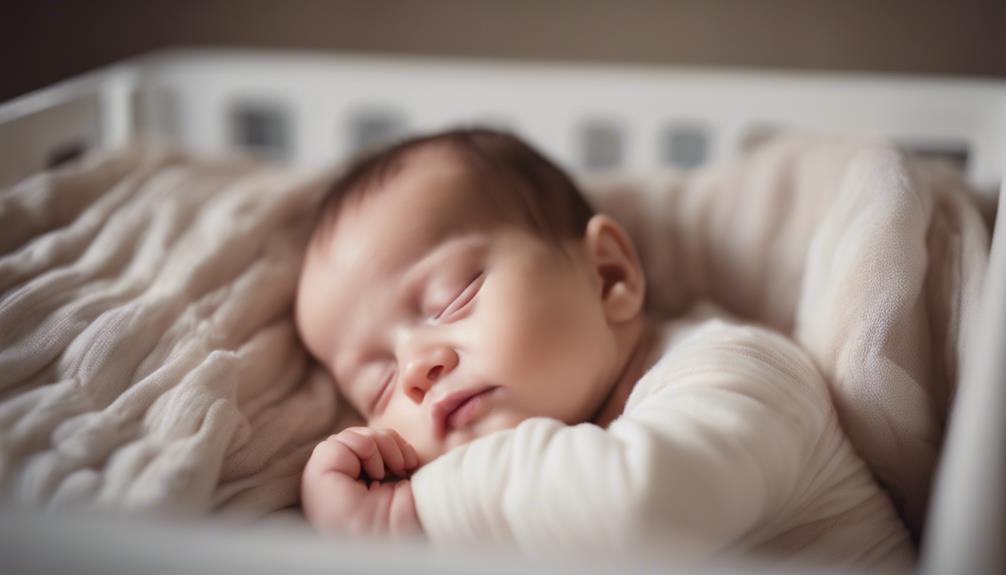
Babies need a comforter for essential emotional soothing and security. It plays a vital role in helping them feel safe, secure, and aids in self-soothing practices. Comforters act as familiar objects that offer security during stressful situations, promoting comfort and reassurance while aiding in managing emotions. They align with important developmental stages, fostering attachment and a secure bond. Additionally, comforters aid in self-regulation skills, emotional stability, and overall well-being. Moreover, they foster a sense of calmness during playtime and bedtime, establishing positive sleep patterns and helping babies cope with separations and changes. Gain deeper insights into the significance of comforters for babies.
Key Takeaways
- Comforters provide emotional soothing and security for babies.
- They aid in self-soothing and emotion management.
- Comforters offer familiarity and support in stressful situations.
- They promote emotional security and stability.
- Comforters help babies feel calm, settled, and secure.
Emotional Soothing and Security
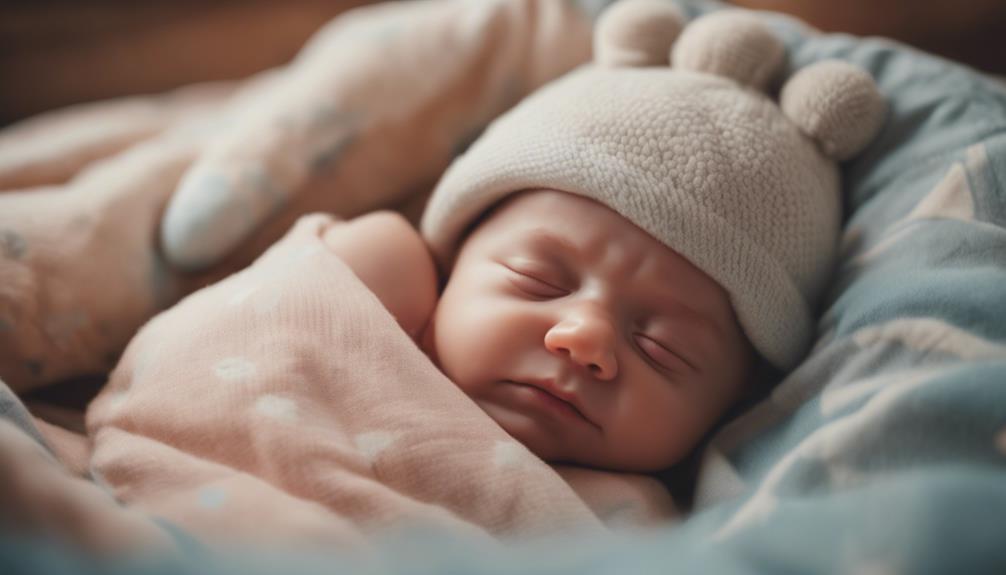
Comforters play an essential role in providing babies with emotional soothing and security through familiar and comforting objects. When a baby forms an attachment to a comforter, it doesn't signify insecurity but rather a vital way to feel safe and secure. The presence of a comforter aids in self-soothing and helps babies manage their emotions, offering a sense of comfort and reassurance. Introducing a comforter around 7-9 months aligns with an important developmental stage where babies seek reassurance and comfort during sleep and wake times.
The emotional benefits of comforters are profound, as they serve as a source of comfort, security, and familiarity for babies, especially during moments of stress or fatigue. By providing a tangible source of comfort, comforters become a reliable companion for babies, offering them a sense of security and emotional support throughout their early years. This attachment to a comforter can significantly contribute to a baby's overall well-being and emotional development.
Sense of Familiarity and Support
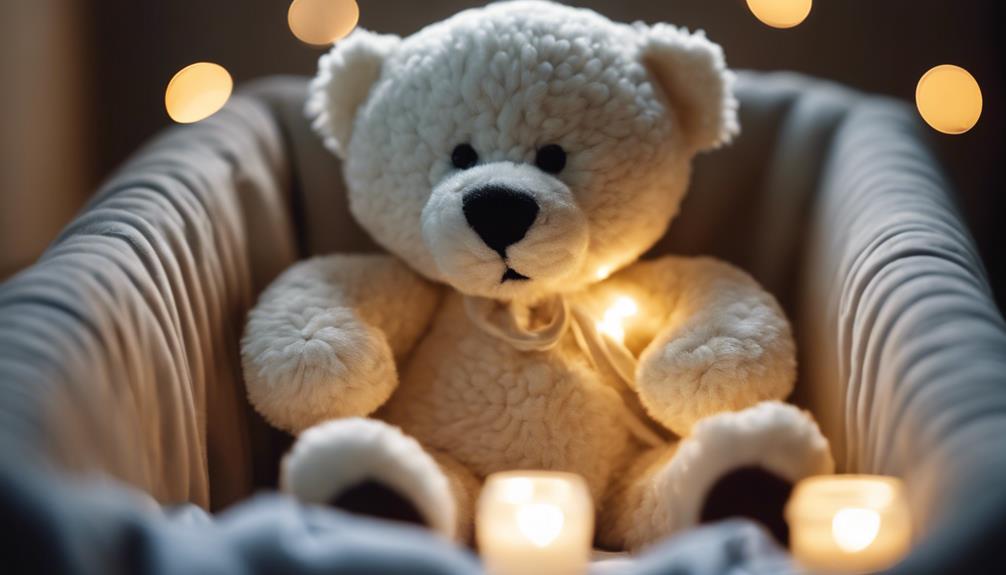
During times of stress or change, babies benefit from the sense of familiarity and support provided by their comforters. Comforters play an important role in helping babies feel safe and secure, promoting a sense of comfort and reassurance.
Here are three ways in which comforters contribute to babies' well-being:
- Familiarity: Comforters act as familiar objects that babies can rely on, especially during unfamiliar or unsettling situations. This familiarity helps babies feel more at ease and secure, providing a sense of continuity and stability in their environment.
- Security: The presence of a comforter offers babies a sense of security, which is essential for their emotional development. Feeling secure allows babies to explore their surroundings with confidence and develop a sense of independence over time.
- Emotional Support: Comforters serve as a source of emotional support, enabling babies to self-soothe and manage their emotions effectively. This emotional regulation is beneficial for babies' overall well-being and helps them navigate different emotional states with more ease.
Aid in Self-Soothing
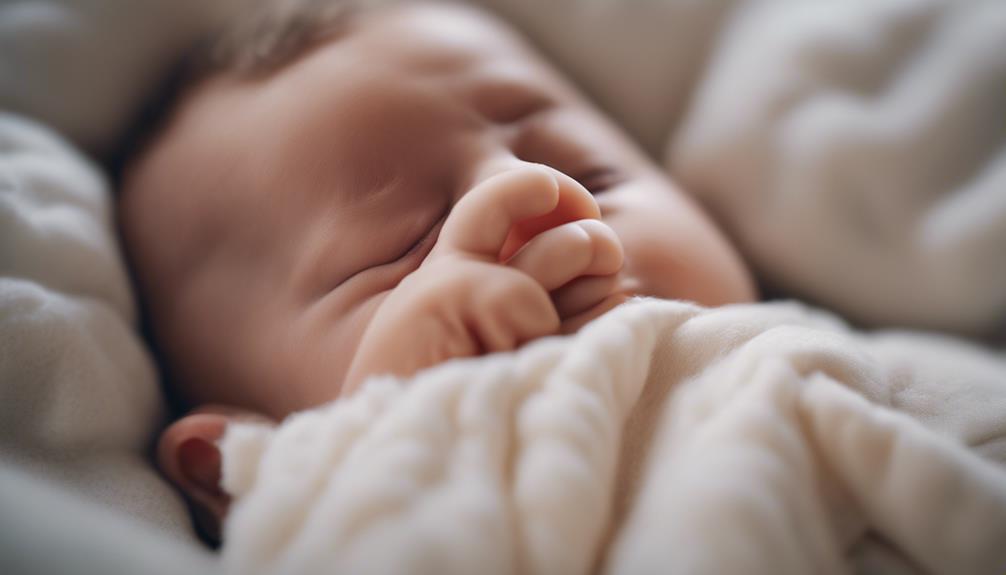
An essential aspect of supporting babies' emotional development is helping them learn to self-soothe independently. Comforters play a vital role in aiding babies in self-soothing by providing a familiar and comforting object that they can rely on.
When faced with situations like separation or change, having a comforter can assist babies in managing their emotions and reducing stress. The presence of a comforter offers a sense of security and reassurance to babies, contributing to their emotional stability.
Babies often form a strong attachment to their comforter, which helps them feel safe and comforted in various circumstances. This attachment not only promotes emotional security but also supports the development of self-regulation skills and coping mechanisms for handling emotional distress.
Promotion of Emotional Security

Moving on from aiding in self-soothing, we now explore how comforters promote emotional security in babies.
Comforters play an essential role in promoting emotional security for babies through various means:
- Attachment: Babies develop a strong attachment to their comforters, forming a secure bond that provides them with a sense of safety and comfort.
- Consistency and Familiarity: Comforters offer a consistent source of familiarity, which can be comforting for babies, especially during times of stress or change.
- Emotional Regulation: Comforters aid in self-soothing and emotional regulation, helping babies manage their emotions more effectively.
By providing a source of comfort and stability, comforters contribute to the overall well-being and security of the baby.
The presence of a beloved comforter can help babies feel settled, calm, and secure in various situations, enhancing their emotional stability and promoting a sense of well-being.
Calmness During Playtime and Bedtime
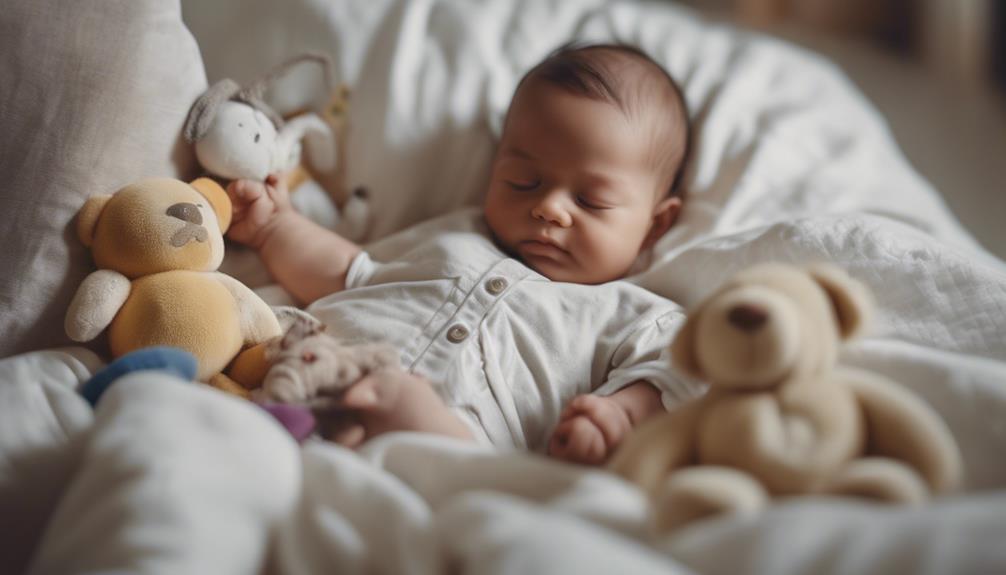
We find that comforters play a significant role in fostering a sense of calmness for babies during both playtime and bedtime routines. Babies rely on their comforters as a source of security and comfort, turning to these soothing objects to help them relax and feel at ease in various environments. This sense of comfort provided by the comforter can aid in establishing a positive shift association, contributing to better sleep patterns for babies.
Using a comforter as a intermediary object can assist babies in coping with separations and changes during playtime and bedtime. The emotional support and stability offered by the presence of a comforter can help babies navigate both playful and restful times with a sense of relaxation and reassurance.
| Keyword | Description |
|---|---|
| Security | Provides a sense of safety and protection for babies |
| Comfort | Offers a feeling of ease and contentment |
| Soothing Object | Helps babies relax and feel calm |
Frequently Asked Questions
What Is the Purpose of a Comforter for a Baby?
Comforters play a vital role in helping babies manage their emotions and provide a sense of love and comfort in times of need.
Introducing a comforter around 7-9 months aids in promoting self-soothing behaviors and helps babies seek reassurance.
Attachment to a comforter doesn't imply insecurity; rather, it supports emotional security through predictable responses from caregivers.
What Age Should a Baby Comforter Be?
When to introduce a baby comforter varies, but around 7-9 months is typical. This age is when babies start seeking emotional soothing and security. By introducing a comforter at this stage, we help them develop a sense of reassurance during stressful times.
Between 6-12 months, babies may form a strong attachment to their comforter, aiding in self-soothing and emotional regulation. It's an important period for building a healthy emotional foundation.
Why Is Bedding Important for Babies?
Bedding is crucial for babies as it offers a sense of security and comfort, aiding in their emotional development. It helps babies self-soothe, manage emotions, and promotes better sleep. Establishing a positive sleep association with bedding makes bedtime routines easier and pleasant.
During changes like weaning or daycare, bedding provides familiarity and comfort. Introducing bedding around 7 months can foster a healthy attachment and coping mechanism for various situations.
How Can a Comforter Help Babies to Settle?
Comforters can create a sense of security for babies, aiding in emotional soothing and self-regulation. Introducing a comforter around 7-9 months can help establish positive sleep associations. Babies may form attachments to comforters, providing comfort during changes and sleep.
Using a comforter can support calmness and better sleep patterns. This small object plays a significant role in a baby's emotional well-being and sleep habits.
Conclusion
In summary, babies need a comforter for emotional soothing, security, and self-soothing. It provides a sense of familiarity and support, promoting emotional security and calmness during playtime and bedtime.
So, next time your little one reaches for their comforter, remember it's not just an ordinary object – it's an essential tool for their well-being and development.
Embrace the comforter, embrace the calmness.
Comforter
Can I Vacuum My Comforter
Tackle the question of whether you can vacuum your comforter and discover the best practices for keeping it fresh and fluffy.
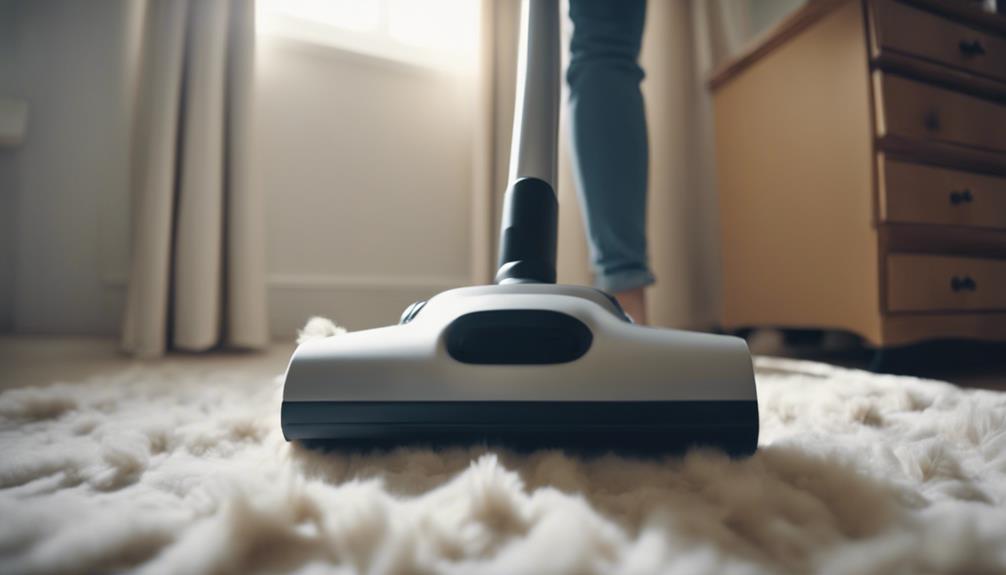
When vacuuming your comforter, make sure it's clean and dry. Avoid vacuuming down or feather-filled ones. After vacuum packing, let the comforter air out and fluff it up. Airing out removes trapped air and helps maintain freshness. Remember to shake the comforter vigorously after washing and use tennis balls in the dryer for better fluffiness. Choose a breathable storage bag and periodically air out your comforter for longevity. Vacuum often with an upholstery attachment and avoid high suction settings. Take care to maintain your comforter's hygiene and loftiness. For more detailed instructions, continue for best comforter care.
Key Takeaways
- Vacuum synthetic-filled comforters for space efficiency.
- Avoid vacuuming down or feather-filled comforters.
- Ensure comforter is clean and dry before vacuuming.
- Vacuuming helps remove allergens and dirt for cleanliness.
- Use proper vacuuming technique to maintain comforter quality.
Benefits of Vacuum Packing Comforters
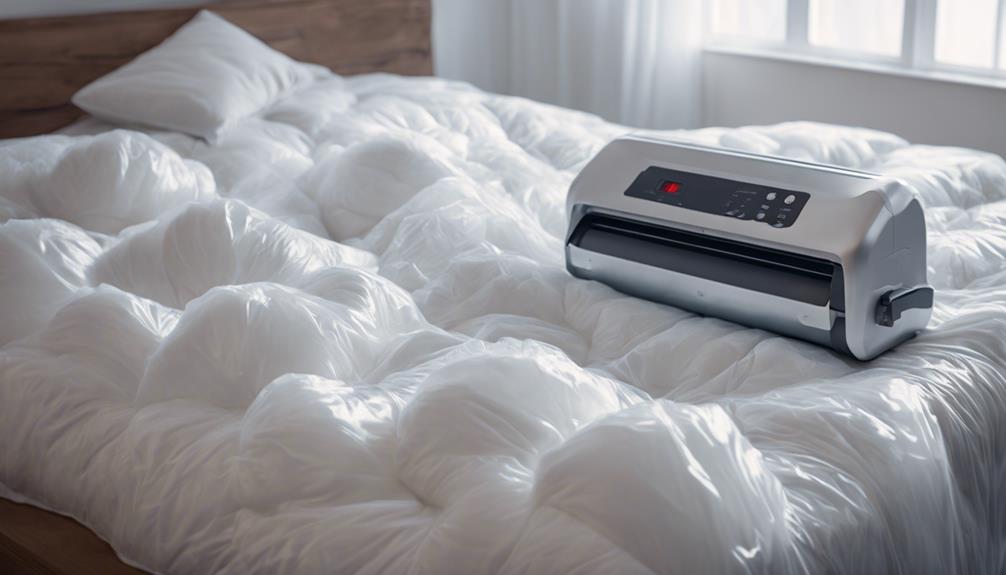
Vacuum packing comforters maximizes storage space while safeguarding them from dampness and odors, making it an efficient solution for compact living spaces. When vacuum packing comforters, the process removes excess air from the storage bag, allowing the comforter to compress into a smaller size. This method not only saves space but also provides protection against moisture and unwanted smells that can affect the comforter's freshness.
Suitable Comforter Types for Vacuum Packing
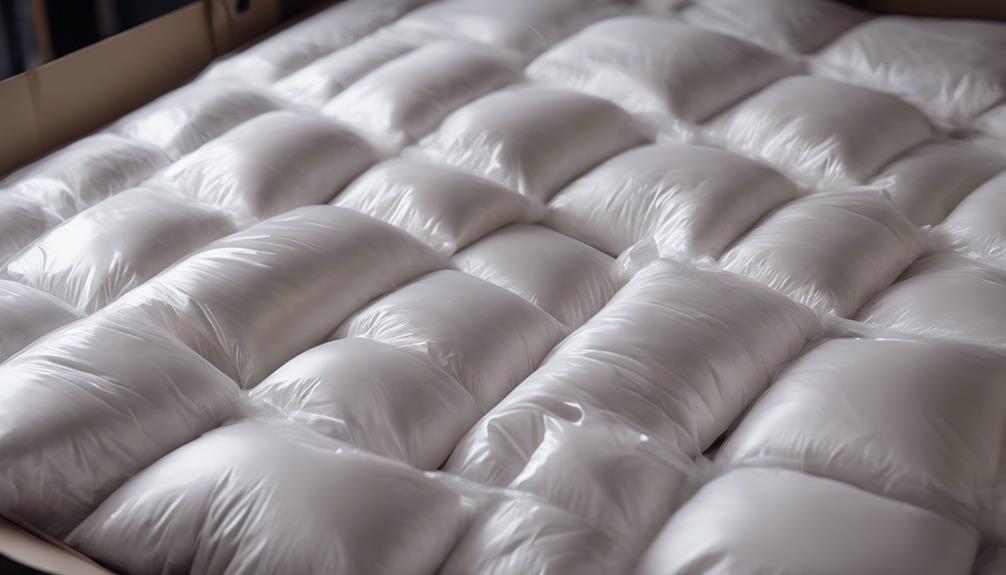
Synthetic-filled comforters are ideal candidates for vacuum packing to maximize storage efficiency and save space. Their construction allows them to compress easily, reducing bulkiness when stored.
Comforters filled with synthetic materials can be tightly packed using a vacuum seal bag, making them perfect for those looking to save space in their closets or storage areas.
On the other hand, down and feather-filled comforters aren't as suitable for vacuum packing. The compression from vacuum sealing can cause these types of comforters to lose their loft and insulation over time, impacting their overall quality and warmth.
It's important to take into account the filling material of your comforter before opting for vacuum packing to guarantee the longevity and effectiveness of the bedding. By choosing the right type of comforter for vacuum packing, you can efficiently utilize storage space while keeping your bedding in top condition.
Preparing Your Comforter for Vacuum Packing

When contemplating preparing your comforter for vacuum packing, it's crucial to make sure it is clean and dry to prevent mold or mildew growth. Before vacuum packing your comforter, spot clean any stains for a thorough cleaning process. Vacuum packing not only saves space but also protects the comforter from dampness and odors during storage. However, avoid vacuum packing down or feather comforters as it may damage the filling and affect their fluffiness. After vacuum packing, make sure to air out the comforter before use and fluff it up to restore its original shape and comfort.
| Cleaning Tips for Comforter Vacuum Packing |
|---|
| Step 1: Check for stains on the comforter and spot clean them. |
| Step 2: Ensure the comforter is completely dry before vacuum packing. |
| Step 3: Use a gentle detergent for any necessary washing before packing. |
| Step 4: Allow the comforter to air out after vacuum packing for a fresh feel. |
| Step 5: Gently fluff the comforter to restore its softness and shape. |
Vacuum Packing Process for Comforters
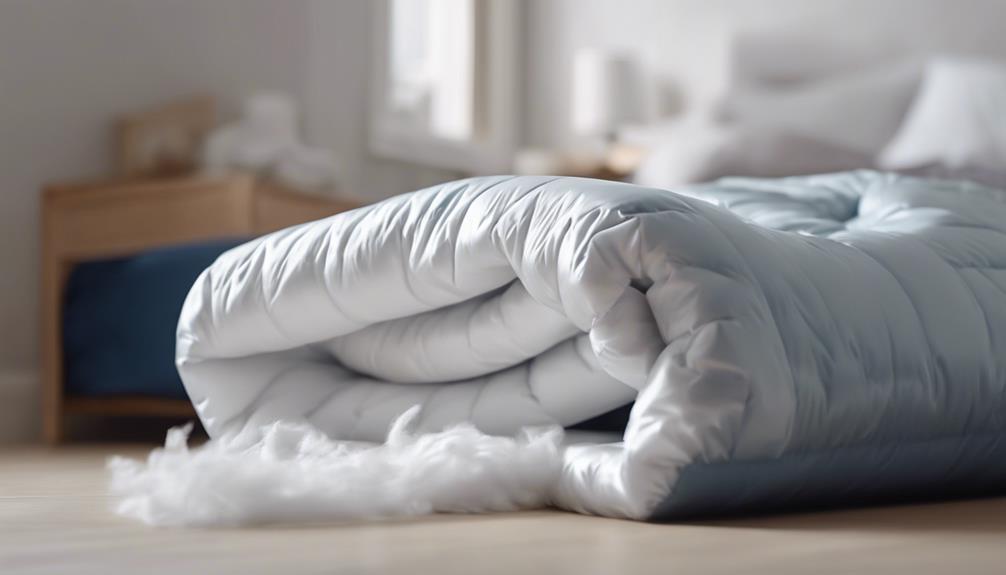
When vacuum packing comforters, it's crucial to contemplate the advantages of this process, the correct vacuuming technique, and the frequency needed for top-notch maintenance.
By vacuuming our comforters, we can effectively eradicate dust mites, allergens, and dirt, promoting a cleaner and healthier sleeping environment.
Understanding the proper vacuuming method and how frequently to perform this task can contribute to extending the lifespan of our comforters and ensuring their continued fluffiness and insulation properties.
Vacuuming Comforter Benefits
By vacuuming your comforter regularly, you can effectively remove dust, dirt, and allergens that accumulate over time, promoting cleanliness and prolonging its lifespan. Here are some benefits of vacuuming your comforter:
- Clean and Fresh: Regular vacuuming helps keep your comforter clean and fresh.
- Prevents Growth of Unwanted Organisms: It can prevent the growth of mold, mildew, and dust mites in your comforter.
- Prolongs Lifespan: By removing dust and dirt, vacuuming can help extend the lifespan of your comforter.
Vacuuming your comforter not only maintains its cleanliness but also guarantees you have a cozy and healthy sleeping environment.
Proper Vacuum Technique
To properly vacuum pack your comforter, make sure you use a vacuum cleaner with a brush attachment to gently remove dust, dirt, and allergens from the fabric surface. When vacuuming your comforter, it's crucial to avoid applying excessive pressure to prevent any damage to the comforter's filling or fabric. By using the brush attachment, you can effectively clean the comforter without causing harm.
Regular vacuuming of your comforter not only helps in maintaining its cleanliness but also extends its lifespan by keeping it fresh and free from allergens. Periodically vacuuming your comforter is a simple yet effective way to guarantee a hygienic sleeping environment and preserve the quality of your bedding. Remember, gentle vacuuming with the right attachment is key to keeping your comforter clean and cozy.
Frequency of Vacuuming
Regularly vacuuming your comforter is essential for maintaining cleanliness and freshness, ensuring a hygienic sleeping environment, and extending the lifespan of your bedding. When it comes to vacuuming your comforter, it's recommended to do so monthly. Here are some reasons why this frequency is important:
- Removal of Dust and Allergens: Monthly vacuuming helps remove accumulated dust, allergens, and debris that can affect air quality.
- Prevention of Deep Settling Dirt: By vacuuming your comforter monthly, you can prevent dirt and dust from settling deeply into the fabric, helping to preserve its quality.
- Healthier Sleeping Environment: Regular vacuuming contributes to a healthier sleeping environment by reducing potential allergens that may impact your sleep quality.
Airing Out Vacuum-Packed Comforters
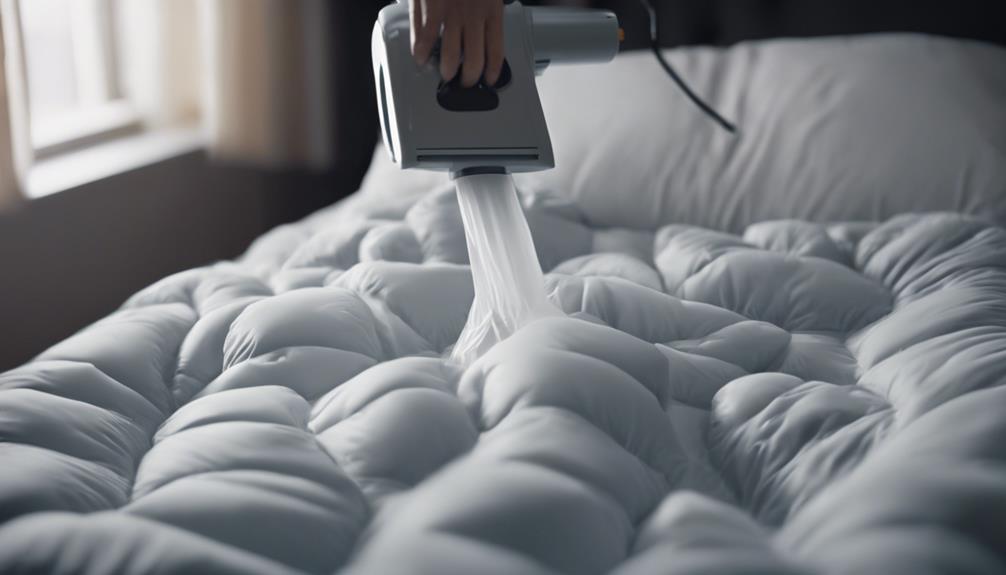
When airing out vacuum-packed comforters, it's essential to allow them to fully expand and breathe before vacuuming for best fluffiness. This process helps remove any trapped air and guarantees a thorough cleaning of the comforter.
Airing out and vacuuming your comforter regularly can maintain its freshness and extend its lifespan.
Vacuuming Process for Comforters
Vacuuming our comforters with a brush attachment helps effectively remove dust, dirt, and allergens, maintaining their freshness and extending their lifespan.
When vacuuming your comforter, remember to:
- Use gentle pressure to avoid damaging the fabric.
- Make sure the vacuum cleaner has a brush attachment for a thorough clean.
- Regularly vacuum to keep your comforter fresh and clean.
Benefits of Airing Out
Airing out vacuum-packed comforters is an essential step in maintaining their freshness and ensuring maximum comfort. When we air out our comforters, we help redistribute the filling evenly, which can freshen the bedding and prevent clumping. Direct sunlight exposure during airing can also be beneficial, as it can help eliminate bacteria and viruses present in the comforter. However, it's important to avoid leaving the bedding on the line overnight to prevent moisture retention. In case outdoor space is limited, using a tumble dryer on a low setting can aid in airing out the comforter effectively. Remember to regularly shake the bedding during airing to maintain its fluffiness and promote proper air circulation.
| Benefit of Airing Out | Description |
|---|---|
| Redistribute filling | Evenly distributes filling to prevent clumping |
| Eliminate bacteria and viruses | Direct sunlight exposure can help eliminate germs |
| Prevent moisture retention | Avoid leaving bedding on the line overnight |
| Use of tumble dryer | Helpful when outdoor space is limited |
| Maintain fluffiness | Regularly shake the bedding for proper fluffiness |
Maintenance Tips for Comforters
Maintaining the freshness and comfort of vacuum-packed comforters involves essential steps, such as airing them out properly to redistribute the filling evenly and prevent clumping. When it comes to comforter maintenance, here are some key tips for airing out your bedding effectively:
- Hang It Outdoors: Hanging duvets outside or near an open window allows sunlight to eliminate bacteria and viruses.
- Use a Tumble Dryer: If outdoor space is limited, using a tumble dryer on a low setting can help air out comforters effectively.
- Avoid Overnight Dampness: It's recommended to avoid leaving bedding on the line overnight to prevent dampness. Regularly shaking and airing out duvets is vital for maintaining their quality and cleanliness.
Fluffing and Redistributing Comforter Filling

To guarantee maximum warmth and comfort from your comforter, fluffing and redistributing the filling regularly is essential. After washing your comforter, it's important to shake it vigorously to help redistribute the filling evenly.
You can also use a lint roller to remove any excess lint that may have accumulated on the comforter. For a more thorough fluffing, consider adding a few tennis balls into the dryer when drying your comforter; the balls will help to agitate the filling and prevent it from clumping together.
By incorporating these simple techniques into your regular comforter care routine, you can make sure that the filling stays evenly distributed, preventing any uncomfortable lumps or shifts. This not only maintains the comforter's original loftiness but also extends its lifespan and preserves its insulation properties.
Tips for Optimal Comforter Storage
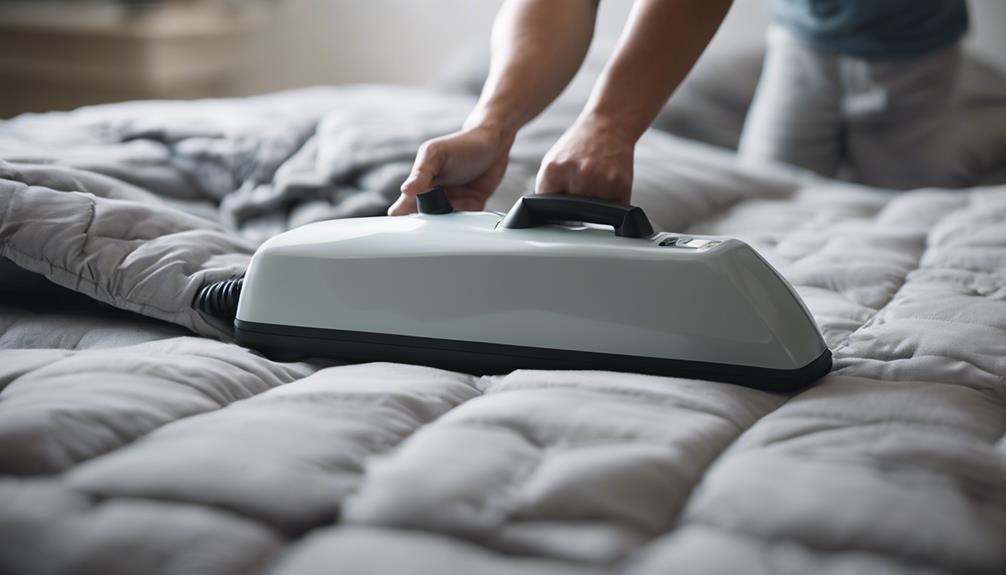
When it comes to ideal comforter storage, choosing the right storage bag is key. Make sure to select a breathable bag that allows air circulation to prevent musty odors.
Additionally, remember to air out your comforter periodically to keep it fresh and fluffy for ultimate comfort.
Storage Bag Options
Exploring various storage bag options enhances the efficiency of storing comforters compactly. When it comes to storing comforters, utilizing vacuum sealing bags can be a game-changer. These bags not only reduce the volume of comforters by up to 80%, saving valuable storage space, but also help protect comforters from dust, moisture, and odors during storage.
To make the most of vacuum sealing, make sure the comforter is clean and completely dry before sealing. Additionally, vacuum sealing bags can offer a cost-effective and efficient solution for storing bedding items like comforters.
Consider these options to keep your comforters in top condition and maximize your storage space:
- Vacuum sealing bags reduce volume by up to 80%
- Protect comforters from dust, moisture, and odors
- Make sure comforter is clean and dry before sealing
Air Out Periodically
Periodically airing out your comforter helps maintain its freshness and eliminates trapped odors. To freshen up your comforter, consider hanging it outside or near an open window to allow for natural ventilation. This process can effectively eliminate bacteria and viruses, keeping your comforter clean and fresh.
If outdoor space is limited, using a tumble dryer on a low setting can achieve a similar effect. Additionally, direct sunlight exposure can help sanitize your comforter and maintain its freshness. Remember to shake your comforter regularly to redistribute the filling and guarantee proper aeration for best storage.
Risks of Vacuum Packing Down Comforters
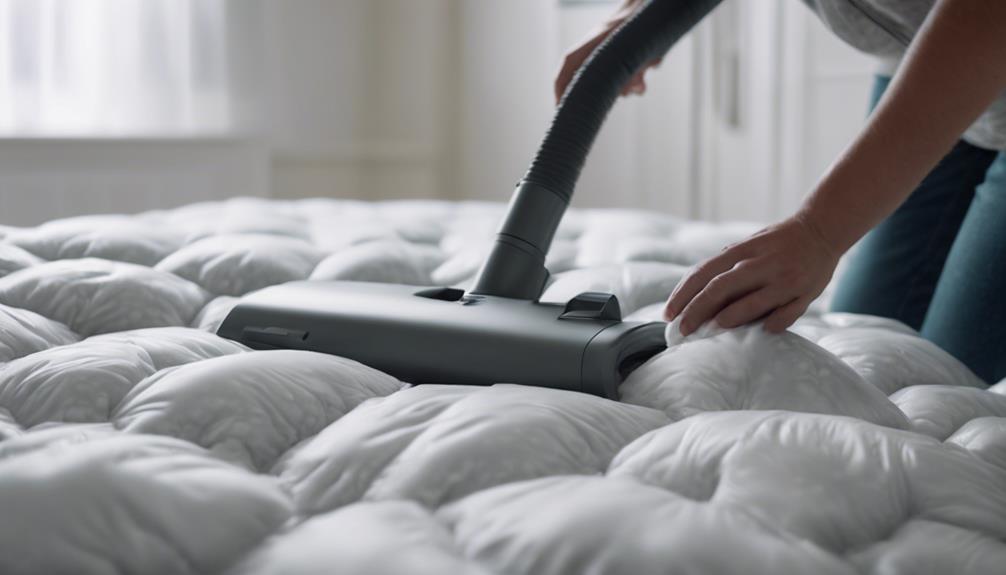
Vacuum packing down comforters poses risks that can compromise their loft, warmth, and overall quality. When considering vacuum packing your down comforter, it's essential to understand the potential drawbacks:
- Loss of Fluffiness: The compression caused by vacuum packing can lead to down clusters sticking together, resulting in a less fluffy and less warm comforter.
- Moisture and Mildew: Down comforters need to breathe to maintain their quality. Vacuum packing restricts airflow, creating a potential environment for moisture buildup and mildew growth.
- Warranty Concerns: Vacuum packing may void the warranty of your down comforter. Altering the structure of the filling through compression can impact the integrity of the comforter and its warranty coverage.
To preserve the loft, warmth, and longevity of your down comforter, it's advisable to avoid vacuum packing and instead opt for proper storage methods.
Cleaning and Maintaining Vacuum-Packed Comforters

Regularly cleaning and maintaining vacuum-packed comforters is essential for ensuring their longevity and cleanliness. Vacuuming your comforter helps to remove dust, dirt, and allergens that can accumulate in the fibers over time.
To effectively clean your comforter, use a vacuum cleaner with an upholstery attachment. Be sure to avoid using a high suction setting to prevent any damage to the fabric. Additionally, using a lint roller can help remove any hair or lint that may be stuck to the comforter.
Dust mites are a common issue with bedding, so regular vacuuming can help eliminate these microscopic pests and keep your comforter fresh between washings. By incorporating these cleaning techniques into your routine, you can maintain the quality and hygiene of your vacuum-packed comforter for years to come.
Alternative Storage Methods for Comforters
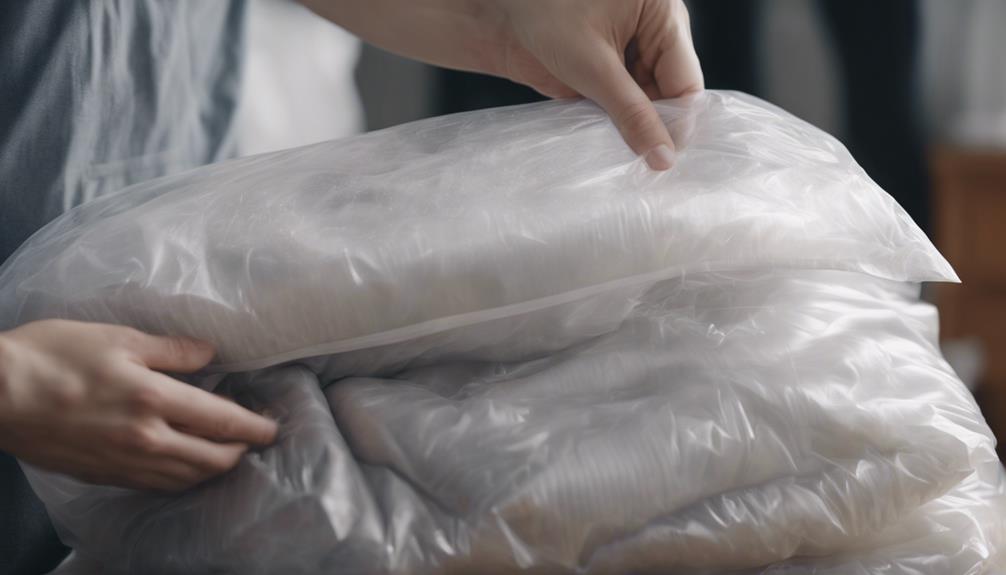
Exploring diverse storage options enhances the longevity and freshness of comforters beyond vacuum packing. When looking for alternative methods to store your comforter, consider the following options:
- Duvet Covers: Investing in duvet covers can provide an extra layer of protection for your comforter while also adding a decorative touch to your bedding. Duvet covers are easy to remove and wash, making it convenient to keep your comforter clean and fresh.
- Fabric Softener: Adding a touch of fabric softener to your laundry routine can help keep your comforter soft and smelling pleasant. Be sure to follow the care instructions on your comforter to determine if fabric softener is suitable for the fabric.
- Delicate Cycle: When washing your comforter, opt for the delicate cycle on your washing machine to ensure gentle cleaning. This setting is ideal for maintaining the quality of your comforter while effectively removing dirt and odors.
Frequently Asked Questions
How to Vacuum Your Bedding?
When vacuuming your bedding, start by using a vacuum cleaner with a brush attachment. Begin at the top and work your way down, ensuring you cover the entire surface. Pay special attention to seams, edges, and any decorative elements to effectively remove debris.
Regular vacuuming helps maintain cleanliness and prolongs the life of your bedding. Vacuuming your bedding can remove dust, dirt, and allergens trapped in the fabric, promoting a healthier sleep environment.
Can I Vacuum a Blanket?
Yes, vacuuming a blanket is a great way to remove dust, dirt, and allergens, helping to keep it clean and fresh.
Using a vacuum cleaner with appropriate attachments is essential to prevent any damage to the fabric.
Regular vacuuming can also prolong the lifespan of the blanket and make sure it stays free of pet hair.
Can I Clean a Blanket With Vacuum Cleaner?
Yes, cleaning a blanket with a vacuum cleaner is an ideal way to remove dirt, dust, and allergens. Using a vacuum with a brush attachment on a low setting helps prevent damage. Regular vacuuming can extend the blanket's lifespan and keep it fresh.
Remember to spot clean stains before vacuuming for best results. Vacuuming is a simple and efficient method to maintain the cleanliness of your blanket.
How Do You Get Dust Out of a Comforter?
To get dust out of a comforter, gently vacuum it with a brush attachment. This helps remove trapped debris, maintaining freshness and cleanliness. Avoid high suction settings to prevent fabric damage.
Regular vacuuming reduces allergens, creating a healthier sleep environment. Remember, a clean comforter promotes better sleep and overall well-being.
Vacuum periodically for best results and enjoy a cozy, dust-free bed.
Conclusion
To sum up, vacuum packing your comforter can be a convenient and space-saving storage solution.
By following the proper steps and precautions, you can safely vacuum pack your comforter to keep it fresh and protected.
Remember to choose the right type of comforter for vacuum packing, prepare it properly, and store it in a cool, dry place.
With these tips in mind, you can guarantee your comforter stays in great condition for future use.
Comforter
Can Baby Have Comforter
Opt for safety-approved comforters for your baby to promote security and better sleep, but are there other considerations to keep in mind?
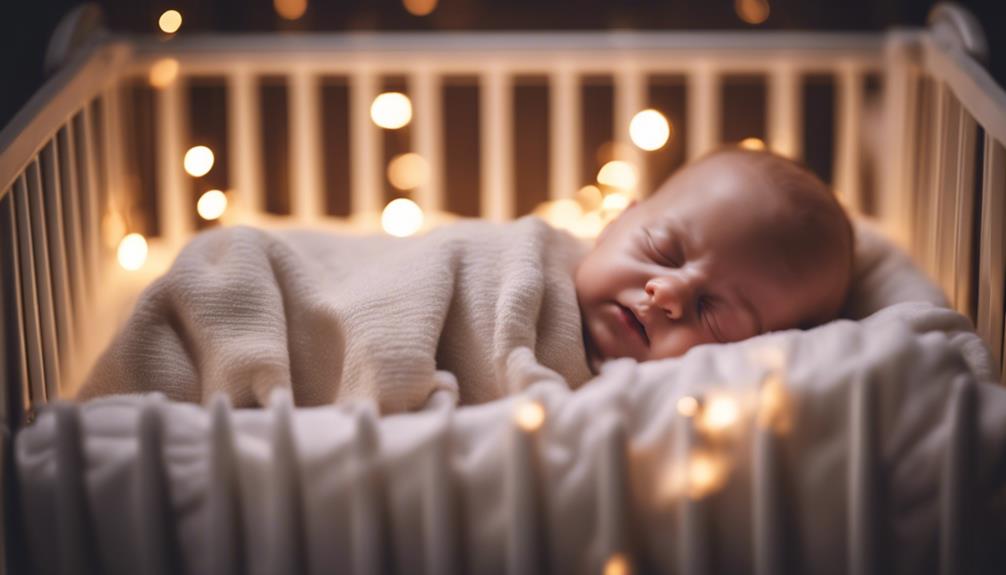
When determining if a baby can have a comforter, make sure it follows safety guidelines. Consider age-appropriate options with no choking hazards. Opt for soft, washable fabrics and simple designs. Supervise your baby during sleep with the comforter. Check for small parts or loose threads. Comforters offer security and better sleep patterns, aiding emotional development and soothing. Manage it wisely by introducing during play or feeding times. Gradually introduce as your child grows. Discover useful tips for comforter use and fostering positive associations. By understanding these factors, you create a secure sleeping space for your baby.
Key Takeaways
- Introduce a soft, safe comforter for supervised sleep.
- Choose a breathable, hypoallergenic fabric comforter.
- Ensure comforter is free of choking hazards.
- Incorporate comforter into daily routines for familiarity.
- Follow safety guidelines and supervise baby with the comforter.
Safety Guidelines for Baby Comforters
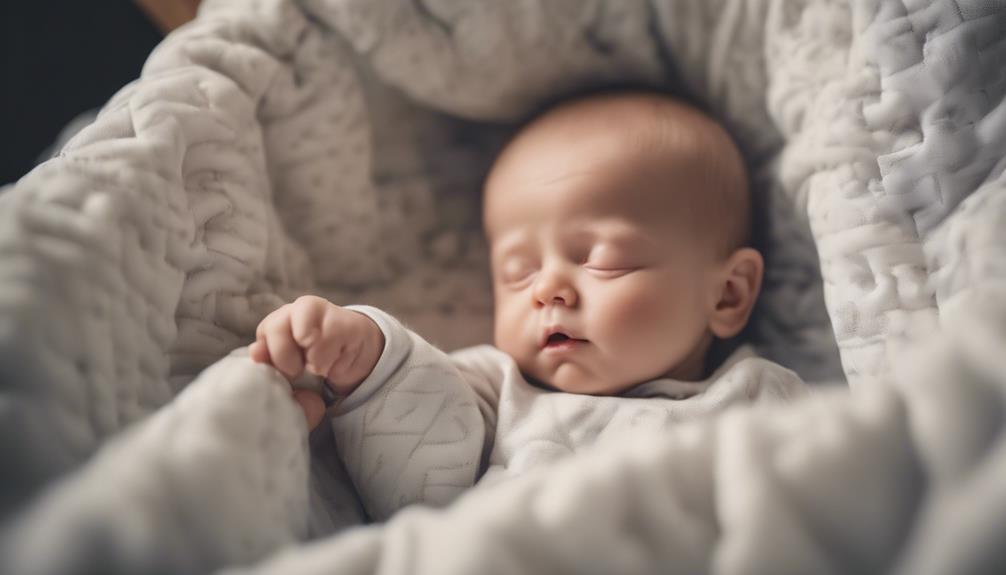
When introducing comforters to babies, prioritizing safety is essential to prevent potential risks. Safe sleep practices are vital when it comes to selecting a comfort object for babies and toddlers. It's important to choose a comforter that's suitable for the child's age and development stage to avoid any choking hazards. Making certain that the comfort item is free of small parts, ties, or batteries can help maintain a safe sleep environment for the baby.
Supervising the use of comforters during the baby's sleep is recommended to prevent any accidents that may occur. Following safe sleep recommendations while introducing a comforter can help reduce the risk of suffocation or other sleep-related incidents. Staying informed about safe sleep practices in your region is also advised to ensure that the baby's sleeping environment remains safe and secure. By adhering to these safety guidelines, parents can create a safe and comfortable sleeping environment for their little ones.
Age-Appropriate Comforter Selection

When selecting comforters for babies, it's important to take into account safety aspects such as material and design. Opt for comforters made from soft, breathable fabrics that are hypoallergenic and free from small parts that could pose a choking hazard.
Additionally, choose comforters with simple, age-appropriate designs that are easy to wash and maintain for the baby's well-being.
Safety in Comforters
For safe comforter use with babies, opt for items made of breathable and washable fabric to minimize suffocation risks. When choosing a comforter for your baby, consider the following safety tips:
- Check for small parts, ties, or batteries that could pose a choking hazard.
- Select a lightweight and appropriately sized comforter to prevent entrapment or strangulation risks.
- Avoid comforters with loose threads or ribbons that may harm the baby.
- Always supervise the baby when using a comforter to guarantee safety during sleep or play.
Material and Design
Selecting a suitable comforter for a baby involves choosing a breathable, washable fabric that's free of small parts and potential suffocation risks. When considering materials and design, opt for something safe for babies, ensuring the comforter is washable and doesn't pose a suffocation risk.
Look for age-appropriate options without ribbons, ties, or heavy embellishments that could be hazardous. It's important to select a light and safe comforter that's securely attached to the cot bars to prevent any accidents.
Benefits of Comforters for Babies
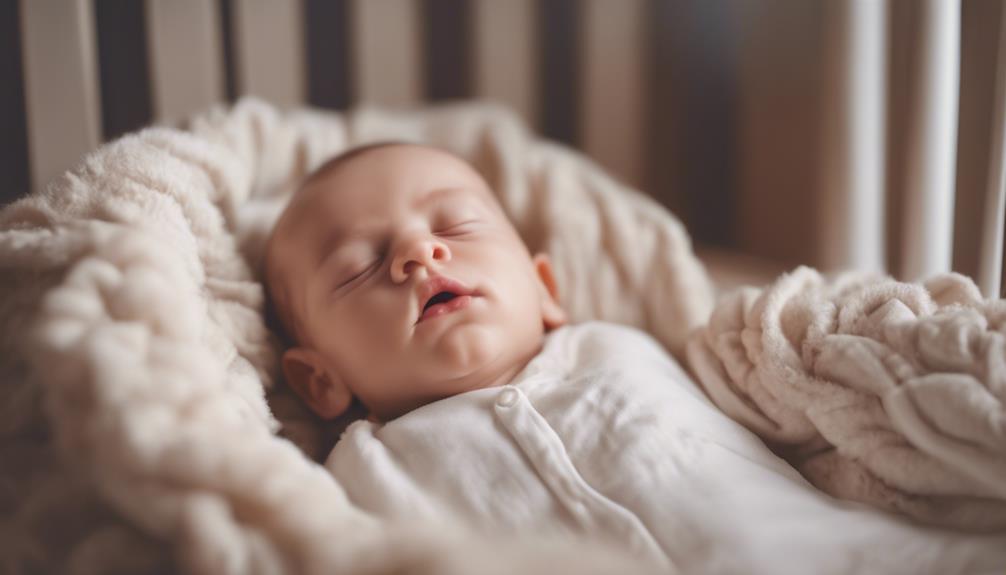
Comforters for babies offer numerous benefits, such as providing a soothing sleep aid that promotes better sleep patterns.
They also offer a sense of security and comfort, helping little ones navigate through new situations with ease.
Introducing a breathable, washable comforter to your baby can assist in fostering healthy attachments and emotional development.
Soothing Sleep Aid
Babies greatly benefit from having a comforting sleep aid that provides emotional support and security during times of stress. Here are some key reasons why comforters are essential for babies:
- Emotional Soothing: Comforters offer a sense of security and comfort, helping babies feel calm and reassured during sleep and stressful situations.
- Attachment Development: Introducing a comforter around 7-9 months can assist babies in seeking reassurance and forming healthy attachments.
- Self-Soothing: Comforters aid in teaching babies how to self-soothe and manage their emotions, fostering independence and confidence.
- Sleep Support: Babies can use comforters to soothe themselves to sleep, navigate changes, and cope with separation anxiety effectively.
Security and Comfort
After exploring the significance of having a soothing sleep aid for babies, it becomes evident that the security and comfort provided by comforters play an essential role in their emotional development and well-being.
Comforters, often in the form of a soft toy, offer babies a sense of security, especially during times of separation anxiety. Contrary to indicating insecurity, attachment to a comforter supports self-soothing mechanisms, helping babies manage their emotions.
It's important to introduce a safe comfort item to babies, ensuring it's suitable for their age and free from potential hazards. By incorporating a comforter into playtime and bedtime routines, caregivers can assist babies in developing healthy attachments and finding comfort in times of stress or change.
Monitoring Devices for Comforter Use
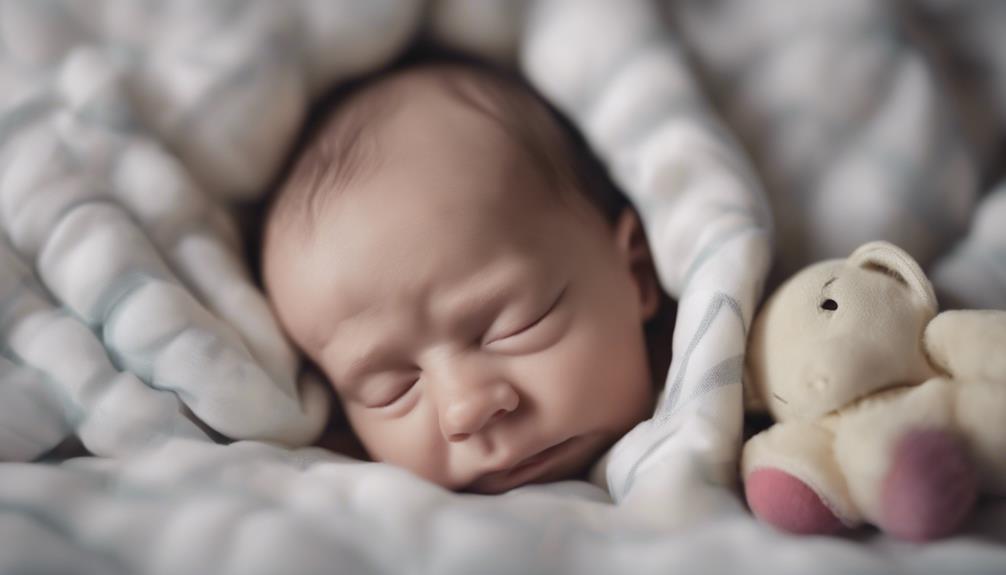
To enhance safety when using comforters, caregivers may opt to utilize monitoring devices such as under-mattress sensors. These devices can provide added peace of mind by alerting caregivers if the baby shows signs of distress while using a comforter. Here are four ways monitoring devices can enhance comforter safety:
- Early Detection: Sensor mats can detect irregularities in the baby's breathing patterns, providing an early warning system for potential suffocation risks.
- Peace of Mind: Parents find reassurance in knowing that they've an extra layer of protection in place to monitor their baby's well-being while using a comforter.
- Customized Care: Monitoring devices allow caregivers to adjust sleeping arrangements based on the baby's movements, ensuring a safe and comfortable sleep environment.
- Parental Support: Addressing parental anxiety about comforter use by discussing concerns and implementing monitoring devices can promote better sleep associations and overall child health.
Online Communities and Comforter Tips
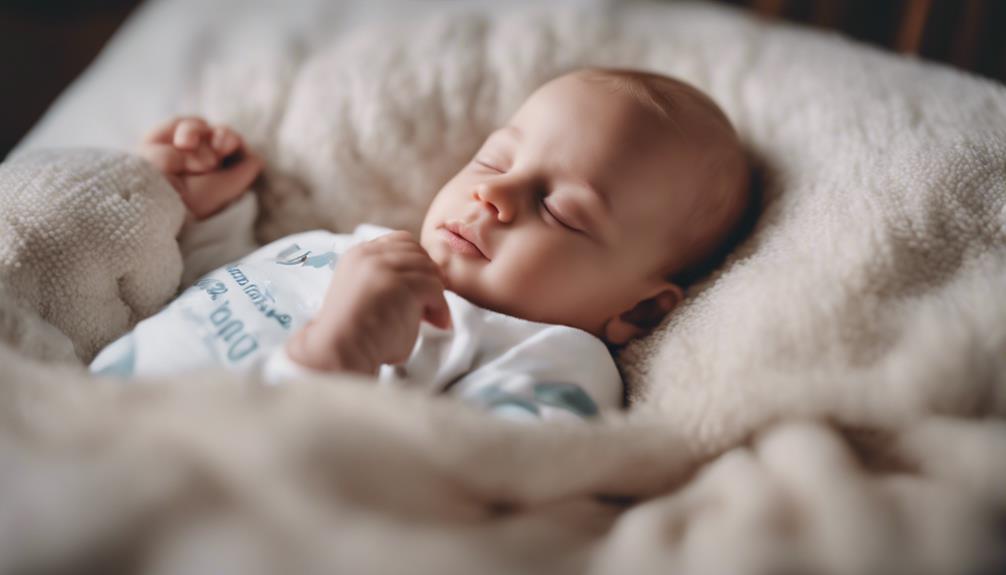
Engaging with online parenting communities can provide valuable insights and tips on safely introducing comforters to babies. When your baby reaches around 6-12 months old, you may consider introducing a comforter to help them self-soothe and feel secure when going to sleep. Online forums are rich with experiences shared by parents who have successfully incorporated comforters into their baby's sleep routine. These communities offer guidance on selecting safe and suitable comforters that meet your baby's needs. Discussions in these online platforms can also help alleviate parental anxiety surrounding comforter use, offering support and reassurance. Below is a table summarizing some key tips from online communities regarding introducing comforters to babies:
| Tips for Introducing Comforters |
|---|
| Wait until around 6-12 months old before introducing a comforter |
| Choose a comforter that is safe and suitable for your baby's age |
| Use the comforter as part of a calming bedtime routine |
| Be consistent in offering the comforter when your baby is going to sleep |
Ensuring Baby's Security With Comforters
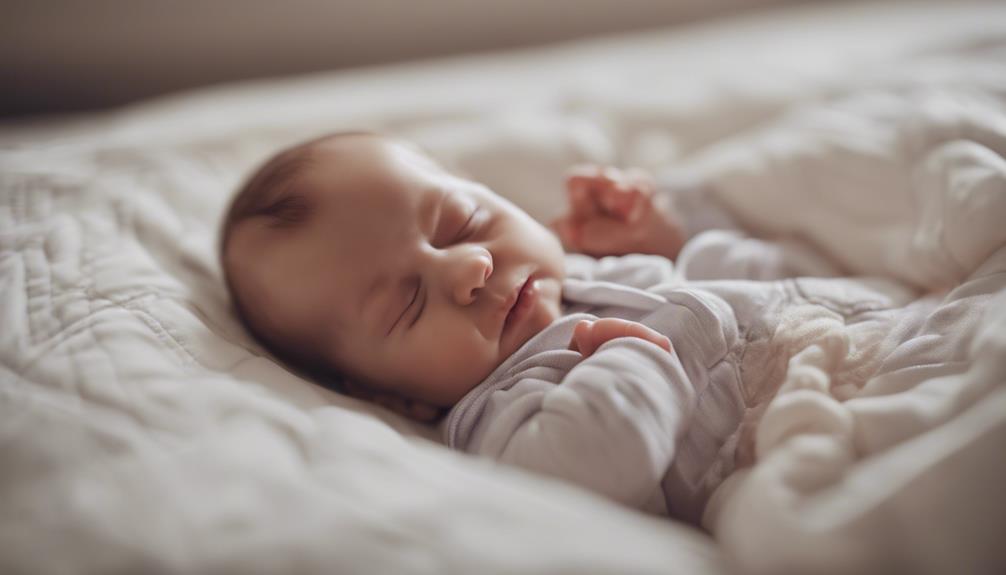
Exploring how comforters can enhance a baby's sense of security and emotional well-being introduces valuable insights for parents seeking to support their child's development. When considering a comforter for your baby, it's crucial to prioritize their safety and well-being.
Here are some key points to guarantee your baby feels secure with their comforter:
- Introduce the comforter at the right time: Offering a comforter to your baby around 7-9 months of age can help them feel safe and secure.
- Encourage self-soothing: A comforter can assist babies in soothing themselves to sleep, promoting better rest and emotional management.
- Choose safe materials: Opt for breathable fabrics and avoid small parts that could pose a choking hazard to secure your baby's safety with the comforter.
- Support emotional development: Comforters play an important role in helping babies manage their emotions and seek reassurance during various developmental stages.
Practical Tips for Comforter Management
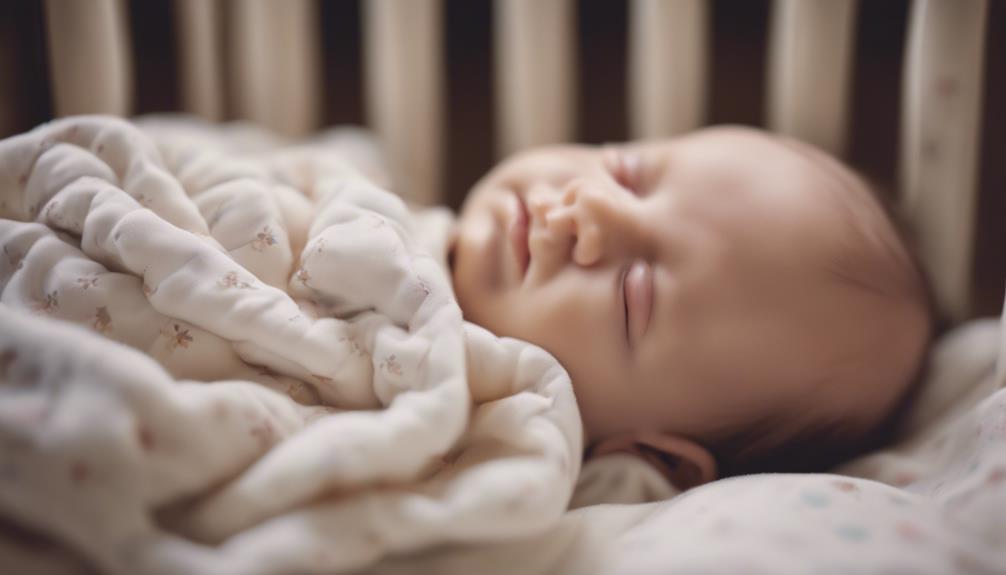
When introducing a comforter to your baby, it's essential to incorporate it into both playtime and bedtime routines to help them become familiar with it.
Choose a baby's comforter that's safe, without small parts, ties, or batteries. Make sure the comforter isn't too large or made of non-breathable fabrics.
During feeding times, introduce the comforter to create positive associations with comfort and security. When using the comforter for sleep, supervise your baby to prevent any risks.
Soft toys can also be introduced alongside the comforter to provide additional comfort and familiarity. Remember, the goal is to make the baby feel secure and soothed, so the comforter should be a calming presence.
Successful Introduction of Comforter to Baby

Introducing a cozy and safe comforter to your baby can greatly contribute to their sense of security and comfort. To guarantee a successful introduction, follow these steps:
- Familiar Scent: Sleep with the comforter yourself before giving it to your baby. This will help make the comfort item smell familiar and comforting to them.
- Incorporate into Routines: Integrate the comforter into various daily activities like feeding times, playtime, and bedtime routines. This will help establish a positive association with the comfort item.
- Supervised Sleep: Allow your baby to sleep with the comforter under supervision before they reach 7-12 months. This can aid in adapting to the comfort item during their sleep cycles.
- Observe and Set Boundaries: Pay attention to how your baby responds to the comforter. Set boundaries for its use and monitor their safe attachment to the comfort item to ensure its effectiveness in providing comfort and security.
Transitioning From Comforter in Toddlerhood
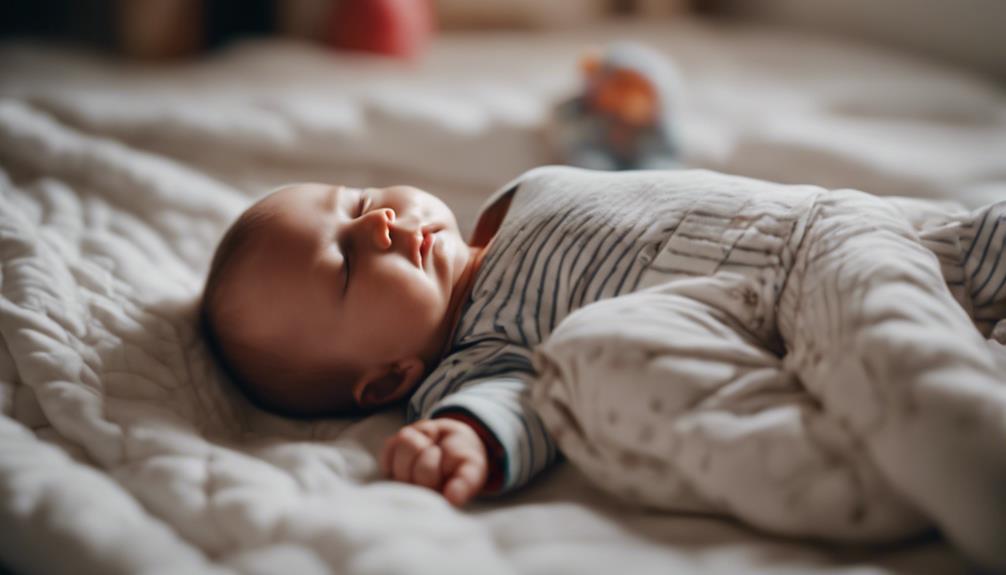
As children grow, their reliance on comfort items naturally diminishes, indicating a gradual shift away from the need for a comforter in toddlerhood. It is essential to understand that moving from a comforter is a normal part of a child's development. While some children may continue to use comfort items into early childhood, most will gradually decrease their dependence on them over time. This reduction in attachment to comfort items is a positive sign of emotional growth and independence.
To help you navigate this change, here is a table outlining some key points to keep in mind:
| Key Points | Description |
|---|---|
| Natural Process | Moving from a comforter is a natural part of a child's development. |
| Decrease in Dependence | Children tend to lessen their reliance on comfort items as they grow. |
| Outgrowing the Need | Children will naturally outgrow the need for a comforter as they develop coping skills. |
Frequently Asked Questions
At What Age Can Babies Have a Comforter?
Babies can have a comforter starting at around 6 months of age when they begin showing signs of independence. Introducing a comforter at this stage can assist with separation anxiety and provide comfort during bedtime.
It may also help soothe babies during stressful situations like immunizations or travel. Waiting until 6 months to introduce a comforter promotes safe sleep practices and encourages healthy attachment behaviors.
Do Babies Sleep Better With a Comforter?
We find that babies can indeed sleep better with a comforter. The familiar item can help them self-soothe and feel secure, potentially leading to improved sleep patterns.
Research indicates that comfort items like a soft toy or blanket can promote feelings of safety and relaxation, contributing to their emotional well-being during sleep.
Establishing a positive association with a comforter may also aid babies in smoother adjustments during changes or challenging situations.
Can a 1 Year Old Sleep With a Blanket?
Yes, a 1-year-old can sleep with a blanket, but it's best to introduce one after 18 months. Waiting helps reduce entanglement and suffocation risks during sleep.
Soft bedding, including comforters, should be avoided to minimize SIDS. For the safest sleep environment, use only a fitted sheet in the crib.
Waiting until at least 18 months before introducing a blanket promotes safer sleep practices and minimizes potential hazards.
What Bedding Is Safe for Babies?
When it comes to bedding for babies, safety is our top priority. A bare crib with just a fitted sheet is the best choice to reduce the risk of Sudden Infant Death Syndrome (SIDS) and suffocation.
Soft bedding like blankets should be introduced after 12-18 months to minimize entanglement risks. Remember, even when placed on top of the baby, soft bedding should be avoided to prevent suffocation and entrapment.
Conclusion
To sum up, introducing a comforter to your baby can provide a sense of security and comfort. By following safety guidelines, selecting age-appropriate comforters, and monitoring their use, you can guarantee a positive experience for your little one.
Remember to seek advice from online communities and follow practical tips for successful management. As your baby grows, consider moving away from the comforter in a gentle and gradual manner to support their development.
Comforter
Comforter When to Use
Journey into the world of introducing a comforter to your baby, starting around 7-9 months for enhanced sleep and comfort—discover more benefits ahead!

When to introduce a comforter for your baby? Around 7-9 months is ideal. This age marks when babies seek reassurance and comfort, fostering positive sleep associations. Safety risks remain before 7 months, like suffocation and choking hazards. Benefits include warmth, security, and better sleep quality. Choose materials like cotton for breathability or silk for luxury. Prioritize safety with choking hazard-free options and supervise their use. In the process of introducing? Make it routine, safe, and consistent. Comforters aid self-soothing, support sleep training, and establish strong attachments. For safe, soothing sleep, choose wisely and start around 7 months—it's essential for your little one's well-being.
Key Takeaways
- Introduce comforters around 7-9 months for security and positive sleep associations.
- Comforters offer warmth, comfort, and emotional soothing for babies.
- Establish stronger attachments with comforters at this age.
- Avoid risks by waiting until 7 months to introduce comforters.
- Use age-appropriate, safe, and breathable comforters for optimal sleep support.
Safe Age to Introduce Comforter
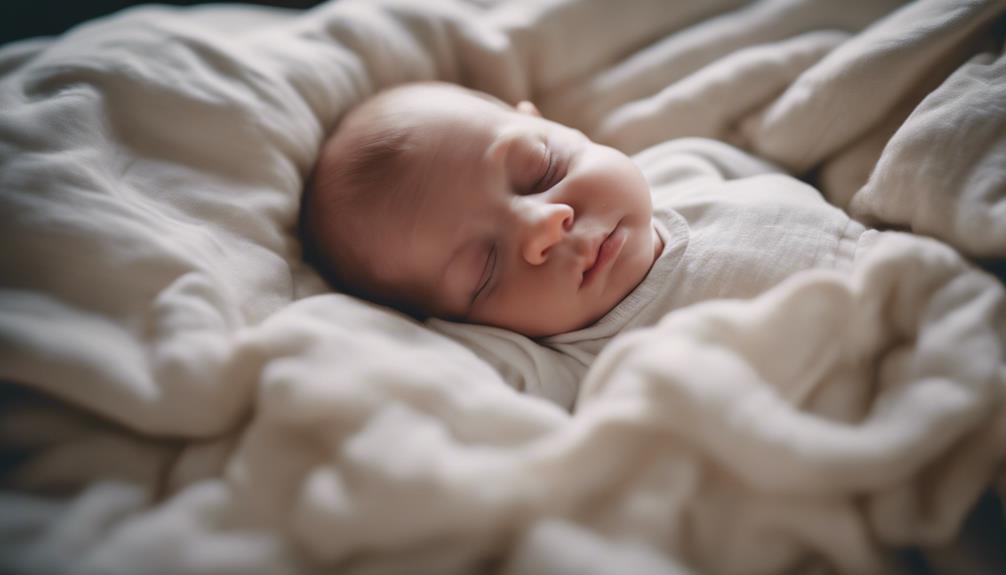
Around 7-9 months is considered the vital age to introduce a comforter to babies as they begin seeking reassurance and comfort during this developmental stage. Waiting until this age allows babies to establish a positive sleep association with the comforter. Babies are more likely to engage with and benefit from a comforter around this time.
Introducing a comforter too early may not be as effective in promoting self-soothing and security. It's essential to choose a safe and breathable comforter when introducing it to babies around 7 months. By waiting until this stage, parents can observe their baby's readiness for a comforter and make sure it becomes a helpful tool in promoting comfort and security during sleep.
This age range aligns with the developmental milestones where babies start forming stronger attachments to objects for comfort, making it an ideal time to introduce a comforter into their sleep routine.
Risks of Early Comforter Use

Using a comforter before the age of 7 months can pose serious risks to a baby's safety during sleep. Infants at this age lack the ability to move bedding away from their faces, increasing the potential for suffocation.
It's important to wait until after 7 months to introduce a comforter to reduce the risk of choking hazards and promote healthy self-soothing skills.
Potential Choking Hazard
Introducing a comforter to infants too early notably raises the risk of choking hazards due to their limited ability to remove objects from their mouths. Babies under 7 months are at a higher risk of choking on small comforter parts. To reduce the likelihood of choking incidents, safety guidelines recommend introducing comforters around 7-9 months when babies have developed better motor skills and coordination. Waiting until the baby is older can greatly decrease the chances of choking incidents related to comforter use. Below is a table illustrating the potential choking hazards associated with early comforter use:
| Age of Infant | Risk of Choking Hazard |
|---|---|
| Under 7 months | High |
| 7-9 months | Reduced |
| Over 9 months | Low |
Delayed Self-Soothing Skills
We must carefully consider the potential risks associated with introducing a comforter to babies too early, especially regarding the delay of their natural self-soothing skills. When babies rely heavily on a comforter for soothing, they may not learn essential self-soothing techniques.
Overuse of the comforter can hinder a baby's ability to calm themselves independently. This delay in self-soothing skills can lead to sleep disruptions when the comforter isn't available.
To promote healthy self-soothing development in babies, it's essential to strike a balance in comforter use. Encouraging babies to learn how to soothe themselves without external aids is beneficial for their overall well-being and independence.
Benefits of Comforter for Babies

Comforters offer babies warmth, security, and comfort as they navigate their sleep routines. These soft blankets can provide a soothing touch, helping infants feel safe and content during bedtime.
Additionally, comforters can act as a sleep aid, assisting babies in settling down and enjoying a restful night's sleep.
Warmth for Baby
Providing essential warmth and insulation, a comforter offers babies a cozy and regulated sleeping environment, guaranteeing ideal body temperature maintenance during rest. Babies benefit greatly from the added layer of warmth provided by a comforter, especially on colder nights or in rooms with drafts. This helps prevent overheating or chilling, creating a comfortable and snug sleeping space for your little one. By using a comforter, you are promoting a peaceful and restful sleep routine, supporting healthy sleep patterns and development. To make sure it's safe for babies, always choose a lightweight and breathable comforter suitable for their age. Below is a table summarizing key points about using a comforter for your baby:
| Benefits of a Comforter for Babies |
|---|
| Regulates body temperature |
| Prevents overheating or chilling |
| Enhances sleep quality |
Security and Comfort
Moving from ensuring warmth for your baby, let's now explore how comforters contribute to their sense of security and comfort. Comforters play an essential role in providing emotional soothing, security, and comfort to babies, helping them feel safe in new situations.
Contrary to what some may think, a baby's attachment to a comforter doesn't suggest insecurity; instead, it fosters emotional security through the love and predictability in parents' responses. By using comforters, babies learn to self-soothe, manage their emotions, and develop healthy attachments that aid in maneuvering changes smoothly.
Introducing comforters safely involves familiarizing babies with the item during playtime and bedtime routines, ensuring it's safe and washable, and allowing supervised use before 7-12 months to promote healthy sleep habits.
Sleep Aid for Infants
Embracing a sense of security and comfort, infants benefit greatly from the soothing presence of a familiar comfort item during sleep. Introducing a comforter when a baby starts to show signs of attachment, typically around 7-9 months, can assist in promoting self-soothing behaviors and a sense of safety.
Babies can form healthy attachments to their comforter, aiding in bedtime routines and changes. The comforter can also help manage emotions and provide comfort during episodes of separation anxiety. Using a safe and appropriate comfort item is essential to promote a sense of security and aid in soothing babies to sleep.
It's important to choose a comforter that's suitable for the baby's age and developmental stage, ensuring a safe and comforting sleep environment.
Comforter Vs. Blanket for Sleep

Comparing comforters to blankets for sleep reveals distinct benefits in promoting self-soothing and positive sleep associations for babies. When deciding between the two, here are some key points to take into account:
- Emotional Soothing: Comforters, unlike blankets, are specifically designed to provide emotional comfort and security during sleep.
- Bedtime Routine: Comforters can become part of a bedtime routine, helping babies associate them with sleep and relaxation.
- Safety: Comforters are safer alternatives to blankets in cribs, reducing the risk of suffocation or overheating.
- Self-Soothing: Introducing a comforter around 7 months can aid in adjustments and help babies learn to self-soothe during the night.
Choosing the Right Comforter Material

When selecting the right comforter material, it's important to explore different types of materials for comparison. Factors like warmth versus weight and allergy-friendly options play a significant role in determining the best comforter material for your needs.
Material Types Comparison
We often consider the material types when choosing the right comforter for our needs. Here are some comparisons to help you make an informed decision:
- Cotton: Breathable and easy to care for, ideal for those with allergies or sensitive skin.
- Wool: Excellent for temperature regulation, naturally moisture-wicking and insulating.
- Down: Lightweight yet provides excellent warmth, perfect for cold winter nights.
- Silk: Luxurious and hypoallergenic, offering a smooth and soft feel for a comfortable night's sleep.
Each material has its unique benefits, so consider your preferences and needs, whether it's for yourself, a baby to sleep safely, or for anyone seeking a good night's rest.
Warmth Vs. Weight
Finding the perfect balance between warmth and weight is essential when selecting the ideal comforter material for a comfortable night's sleep. To help you make an informed decision, we've prepared a comparison table below:
| Comforter Material | Warmth Level | Weight |
|---|---|---|
| Down Fill | High | Medium |
| Synthetic Fill | Moderate to High | Light |
| Cotton | Moderate | Light |
Considering the connection between sleep quality and comfort, it's vital to choose a comforter that provides adequate warmth without feeling too heavy. This balance is especially important for child health, as children's sleep can be influenced by the right bedding materials. By carefully evaluating warmth versus weight, you can ensure a restful night's sleep for yourself and your loved ones.
Allergy-Friendly Options
For individuals with allergies, selecting hypoallergenic materials such as cotton, bamboo, or silk is crucial when choosing an allergy-friendly comforter. When considering allergy-friendly options for your comforter, keep the following in mind:
- Avoid down-filled comforters: Down can trigger allergic reactions in some individuals.
- Look for certifications: Opt for comforters that are Oeko-Tex or GOTS certified to guarantee they're free from harmful chemicals.
- Regular washing: Wash your bedding, including the comforter, regularly in hot water to remove dust mites and allergens.
- Use a duvet cover: Choose a duvet cover that's easy to remove and wash frequently to maintain cleanliness and reduce allergens.
Comforter Safety Guidelines

Guarantee the comfort item chosen for your baby is free of potential choking hazards to secure their safety during sleep. When considering comforter safety guidelines, it's important to prioritize safe sleep practices. Select a comforter that's age-appropriate and doesn't have small parts that could detach and pose a choking risk. Always follow safe sleep recommendations when introducing a comforter to your baby's sleep routine to reduce the risk of accidents or suffocation. It's essential to supervise the use of comforters during sleep to monitor your baby's safety and well-being closely.
Stay informed about safe sleep practices in your region to create a secure sleep environment for your baby. By being proactive and knowledgeable about potential risks and safety guidelines, you can ensure that your baby's sleep space is free of hazards. Prioritizing comforter safety guidelines and safe sleep practices will help provide a safe and comfortable sleeping environment for your little one.
Transitioning to a Comforter

After guaranteeing the safety of the comforter for your baby, it's beneficial to gradually introduce it around 7 months to promote independent self-soothing. Shifting to a comforter can be a smooth process with the right approach. Here are some steps to contemplate:
- Incorporate the Comforter into Feeding and Wind-Down Routines: Utilize the comforter during feeding times or as part of a calming wind-down routine before naps or bedtime. This helps the baby associate the comforter with positive experiences.
- Choose a Safe and Breathable Comforter: Opt for a comforter made from breathable materials to ensure comfort and safety for your baby. Avoid comforters with small parts that could be a choking hazard.
- Sleep with the Comforter to Transfer Your Scent: Sleeping with the comforter for a few nights can transfer your scent onto it, helping your baby feel more secure and comforted when using it.
- Be Consistent and Patient: Consistency is key when shifting to a comforter. It may take time for your baby to form a strong association with the comforter, so be patient and persistent in your efforts.
Comforter for Sleep Training

Introducing a comforter around 7 months can greatly aid in the sleep training process by assisting babies in self-soothing independently. During sleep training, a comforter serves as a reassuring object that helps babies feel secure and calm in their cribs. Here is a table outlining the benefits of using a comforter for sleep training:
| Comforter for Sleep Training | Benefits |
|---|---|
| Assists in self-soothing | Enables babies to comfort themselves |
| Establishes positive association | Creates a link between comforter and sleep |
| Promotes consistency | Helps in establishing a routine |
| Supports patience | Encourages gradual progress in sleep habits |
| Enhances security | Becomes a source of comfort during changes |
Comforter for Self-Soothing

When incorporating a comforter for self-soothing, babies learn to rely on a source of comfort and security to promote independent sleep habits. Here are some key points to keep in mind when using a comforter for self-soothing:
- Promoting Self-Soothing: Comforters help babies develop self-soothing skills by providing a sense of security and familiarity, which can assist in calming them during sleep times.
- Reducing Reliance on Parental Intervention: By introducing a comforter, babies may learn to soothe themselves without constant parental involvement, fostering a sense of independence.
- Establishing Positive Sleep Associations: Introducing a comforter around 7 months can help create positive sleep connections for babies, aiding in their bedtime routines and changes.
- Forming Healthy Attachments: Consistently introducing the comforter with patience can help babies form healthy bonds to it, which can serve as a reliable source of comfort for self-soothing purposes.
Comforter Usage Tips

For the best comforter usage, make sure to choose a breathable and safe option for your baby's sleep environment. Introducing a comforter around 7 months can assist your baby in self-soothing independently, helping them establish positive sleep associations.
Consistency is key – use the comforter during feeds and wind-downs to create a routine that signals bedtime. Opt for a comforter that's gentle on your baby's delicate skin and allows for proper airflow to prevent overheating.
To enhance the comforter's effectiveness, consider sleeping with it for a night or two to transfer your scent, providing added security for your baby.
Frequently Asked Questions
What Is the Purpose of a Comforter?
The purpose of a comforter is to provide babies with a sense of security and aid in self-soothing during sleep. It establishes positive sleep associations and helps in bedtime routines, fostering independence and emotional comfort.
Using a comforter consistently can help babies form healthy attachments and manage emotions effectively. Introducing a comforter around 7 months can promote independence and provide familiarity during changes, offering comfort in various situations.
Are Comforters for Summer or Winter?
For summer or winter use, comforters serve varied purposes. In summer, opt for lightweight options with breathable fabrics to prevent overheating. These keep you cool while providing comfort.
Conversely, winter comforters offer warmth with heavier fills and insulating materials. Select based on the season's temperature and your personal comfort preferences. Both types cater to different needs for a cozy night's sleep, ensuring you rest comfortably year-round.
Are You Supposed to Use a Comforter as a Blanket?
Yes, you can use a comforter as a blanket, but it's important to take safety guidelines into account.
For babies, it's best to avoid using a comforter due to suffocation and overheating risks. Instead, opt for a thin blanket or sleep sack after 18 months.
Soft bedding should be avoided to prevent suffocation hazards. Waiting until at least 18 months to use a blanket can help guarantee a safer sleep environment.
When Can You Introduce a Comforter at Night?
We can introduce a comforter at night around 7 months of age to help babies self-soothe and establish positive sleep associations.
Consistency and patience in using a comforter can aid in developing a comforting sleep routine.
Ensuring the comforter is safe and breathable is vital for the baby's emotional comfort and security.
Conclusion
To sum up, introducing a comforter to your baby at the right age can provide benefits like self-soothing and comfort during sleep.
Remember to choose a safe material and gradually shift to avoid any risks. Using a comforter can aid in sleep training and promote independent sleep habits.
So, when in doubt, remember that a comforter can be a cozy companion for your little one, like a warm hug on a chilly night.
-

 Vetted1 month ago
Vetted1 month ago14 Best Personalized Father's Day Gifts for Your Husband – Show Him You Care
-

 Alfresco1 month ago
Alfresco1 month agoAlfresco Stacker Doors: Seamless Indoor-Outdoor Living!
-

 Craft and Textiles3 months ago
Craft and Textiles3 months ago15 Best Places to Buy Appliances for Your Home – Top Retailers Reviewed
-

 Decorative Throws3 months ago
Decorative Throws3 months agoIs It Better to Dry Clean Blankets?
-

 Tableware and Dining Accessories3 months ago
Tableware and Dining Accessories3 months agoWhat Is the Meaning of the Word Tableware
-

 Tableware and Dining Accessories3 months ago
Tableware and Dining Accessories3 months agoWhat Is the Hindi Meaning of Tableware
-

 Craft and Textiles3 months ago
Craft and Textiles3 months ago15 Best Cordless Mowers for Effortless Lawn Care – Top Picks of 2024
-

 Yarn3 months ago
Yarn3 months agoIs Yarn Natural or Manmade? Unravel the Truth






















